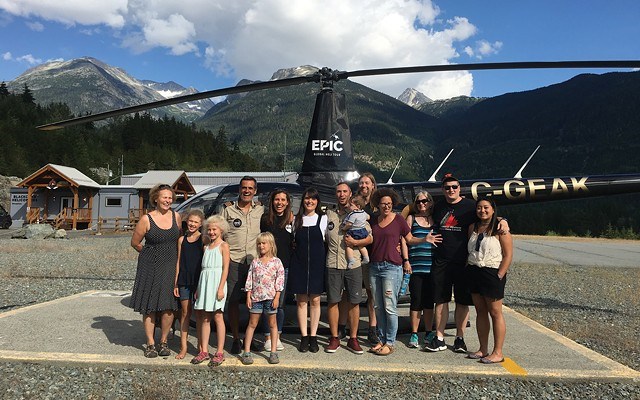At one point, midway through their journey around the world, Whistler resident Ruben Dias and his co-pilot Mischa Gelb were ready to abandon their quest to complete the fastest equatorial antipode circumnavigation in a helicopter.
The duo was waiting on a permit to enter Pakistan. They put their journey, dubbed the "EPIC World Tour," for Empowering People Inspiring Change, on hold and flew home (this time on a commercial aircraft) to visit family while they waited. Dias, a helicopter pilot and serial entrepreneur, and Gelb, a Lower Mainland-based heli instructor, returned back to Dubai after being told they could expect their permit on July 1. After that date came and went, the pair concluded that meant their approval wasn't coming.
They re-mapped a new plan that would see them backtrack before returning home in their Robinson R66 helicopter. Unfortunately, that meant giving up their chance to set a world record. The new route wouldn't allow them to hit a second antipode in Indonesia — located on the exact opposite side of the world from the first antipode they crossed in Colombia — in time to beat the record.
"That moment was very difficult for us," Dias recalled.
But behind the scenes, a bellman at the Dubai hotel Dias had been chatting to about their dilemma went above and beyond to help. As Dias and Gelb recounted in one of their daily vlogs, that bellman contacted a high-profile Pakistani diplomat who was also staying at the hotel and asked if he could pull some strings. The diplomat said he would make a call. The next day, Dias and Gelb had their permit.
"We were about to pull the plug and go back to Turkey, then Russia and not do this Pacific route. We were in a hotel, and we were going to the taxi to go away, and we received a phone call that we got the permit," Dias recalled. "It was that moment; it was like one minute and we were supposed to be somewhere else. That was one of the things that was really unbelievable this trip."
That delay was only one of the many challenges the pair encountered that made it all the sweeter when they landed at Whistler's municipal heliport on Sunday afternoon, Aug. 5, to the cheers of a small crowd of family, friends and fans, exactly 97 days after taking off from the same location on May 1.
In addition to accomplishing their goal of completing the fastest equatorial antipode circumnavigation on a helicopter, Dias said they also completed the longest distance trip around the world in a helicopter, ever. "We're going to calculate the exact kilometres, but it's above 60,000," he explained.
The pair credited their achievement to a solid working relationship and steady support system. "We had an incredible operations team that just made the trip go fluid," explained Gelb, adding that "It takes extremely aligned personalities to make a trip like this happen, and an incredible amount of determination."
The pilots also chose "a very, very hard route," Dias said. It took pilot Peter Wilson 122 days to complete the same route — the first-ever helicopter circumnavigation to touch the equator in both the Eastern and Western Hemispheres — last year. "He gave us a lot of advice. He did this route, but we did it a little bit [faster]. We wanted to beat him," Dias said with a laugh.
Throughout their journey, Dias and Gelb kept their thousands of followers up-to-date through a series of daily vlogs posted to .
They also hosted a series of speaking engagements and conferences centered on entrepreneurship and healthy living — both factors that boosted morale and "gave us motivation to keep on," Dias said.
"I don't even have the words to describe [how returning home feels,]" Dias said. "The moment is so strong. We left on the first of May, and we knew there were going to be a lot of challenges and we had a big effort in front of us, but we didn't imagine what we were going to go through."
Completing the journey "is so meaningful," to the duo, said Dias, as well as to Dias' children Diogo and Catarina, who each hopped in the heli for approximately half of the journey.
"It's just amazing to be home," Gelb added. "It feels oddly familiar, almost like we didn't leave. It's very weird."
As for what they took away from a trip that brought them through "deserts and glaciers, through forests, wet, dry, everything?"
"I can assure you one thing: we were commenting, both of us, that we've travelled a lot — this trip, we did 42 countries — but the best place to live on Earth is Whistler," Dias said.
"Specifically Whistler, but all of B.C. British Columbia is just the most beautiful place."



